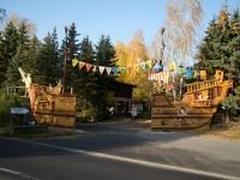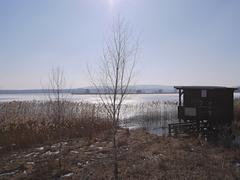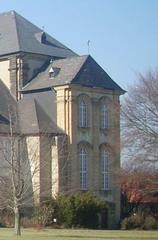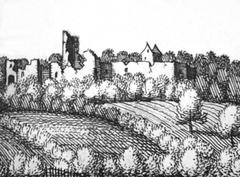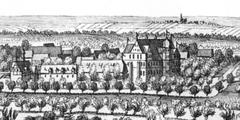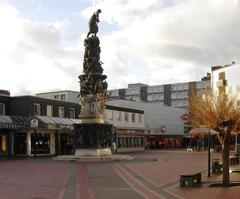Guide to Visiting Bockwindmühle in Heere, Germany
Publication Date: 01/08/2024
Introduction to Bockwindmühle
Nestled in the picturesque village of Heere, Germany, the Bockwindmühle stands as a beacon of historical and architectural brilliance. This 18th-century post mill is not merely a relic of the past but a living testament to centuries of agricultural and industrial ingenuity. Post mills like the Bockwindmühle were pivotal in Europe’s agricultural and industrial development, providing an efficient means to grind grain (Waymarking). The Bockwindmühle’s unique structure, which allows the entire mill body to rotate around a central post to face the wind, showcases the remarkable engineering and craftsmanship of its era. Beyond its architectural significance, this windmill holds cultural and educational value, offering visitors a deep dive into the rural life and technological advancements of historical Germany (Allied Travel). From interactive guided tours to picturesque photography spots, the Bockwindmühle provides a comprehensive experience that appeals to history enthusiasts, architecture buffs, and casual tourists alike.
Contents Overview
- Introduction
- History of Bockwindmühle
- Origins and Construction
- Relocation and Preservation
- Architectural Significance
- Historical Context
- Impact of World War II
- Restoration and Maintenance
- Cultural Significance
- Educational Value
- Modern-Day Relevance
- Visitor Information
- Visiting Hours
- Ticket Prices
- Guided Tours
- Accessibility
- Travel Tips
- Nearby Attractions
- Photographic Spots
- FAQ
- Conclusion
- Sources and Further Reading
History of Bockwindmühle
Origins and Construction
Built in 1709, the Bockwindmühle, or post mill, is a testament to the engineering and architectural prowess of the time. It is the oldest mill in the Emsland region and the only fully preserved mill of its kind in Papenburg. The entire mill body is mounted on a single post, allowing it to be turned to face the wind (Waymarking).
Relocation and Preservation
Originally located in Niederlangen near Lathen, the Bockwindmühle was relocated to Papenburg in 1965 to replace the Mauers Mühle, which was destroyed during World War II. This move was part of efforts to preserve the region’s historical and cultural heritage (Waymarking).
Architectural Significance
The Bockwindmühle’s unique design allows the entire structure to rotate around a central post to face the wind, maximizing efficiency. Mounted on a sturdy wooden framework known as the “bock,” this design is rare and adds to the mill’s historical significance (Waymarking).
Historical Context
Built during a period of significant agricultural and industrial development in Germany, the Bockwindmühle played a crucial role in the agricultural economy, providing a reliable means of grinding grain into flour. Its construction coincided with advancements in windmill technology (Allied Travel).
Impact of World War II
World War II led to the destruction of many historical structures, including the Mauers Mühle. The acquisition and relocation of the Bockwindmühle were part of post-war efforts to preserve cultural heritage. It now serves as a symbol of resilience and historical continuity (Waymarking).
Restoration and Maintenance
The Bockwindmühle has undergone several restoration efforts to preserve its structural integrity and historical authenticity. These efforts include repairing the wooden framework and replacing worn-out components. Preservation is a collaborative effort involving local authorities, historical societies, and the community (Waymarking).
Cultural Significance
Beyond its architectural and historical importance, the Bockwindmühle is a cultural symbol representing the ingenuity and craftsmanship of the past. It is a popular tourist attraction, drawing visitors interested in exploring Germany’s rich history (Allied Travel).
Educational Value
The Bockwindmühle serves an educational purpose, offering guided tours that explain its construction, operation, and historical significance. These tours provide insights into the history of windmill technology and its role in the agricultural economy (Waymarking).
Modern-Day Relevance
Today, the Bockwindmühle stands as a symbol of sustainable practices and renewable energy. It highlights the importance of sustainable practices and learning from historical technologies (Allied Travel).
Visitor Information
Visiting Hours
The Bockwindmühle is open to the public year-round. Visiting hours vary by season, so it is advisable to check the official website for the most up-to-date information.
Ticket Prices
Tickets can be purchased at the entrance or online. Prices vary for adults, children, and groups. Discounts are often available for seniors and students.
Guided Tours
Guided tours are available and provide a comprehensive understanding of the mill’s history and significance. Tours can be booked in advance through the official website.
Accessibility
The site is accessible to visitors with mobility issues, but some areas of the mill may present challenges due to the historical structure.
Travel Tips
Visitors are encouraged to wear comfortable shoes and bring weather-appropriate clothing. The surrounding area offers picturesque views and opportunities for photography.
Nearby Attractions
Papenburg boasts several historical sites and attractions worth exploring, including the Papenburg Zeitspeicher and the Meyer Werft shipyard.
Photographic Spots
The Bockwindmühle and its surroundings provide excellent opportunities for photography, capturing the essence of the rural landscape of the Emsland region.
FAQ
What are the visiting hours for Bockwindmühle?
Visiting hours vary by season. Check the official website for the most current schedule.
How much do tickets cost for Bockwindmühle?
Ticket prices vary for adults, children, and groups. Discounts are available for seniors and students.
Are guided tours available?
Yes, guided tours are available and recommended for a detailed exploration of the windmill.
Conclusion
In summary, the Bockwindmühle in Papenburg is a historical and cultural treasure offering valuable insights into the past. Its unique design, historical significance, and cultural impact make it a fascinating destination. The preservation efforts ensure that future generations can continue to appreciate this remarkable piece of history. Plan your visit today and explore the rich heritage of Papenburg (Allied Travel).
Sources and Further Reading
- Waymarking, n.d., https://www.waymarking.com/waymarks/wmM68C_Bockwindmhle_an_der_Wiek_Papenburg_Germany
- Allied Travel, n.d., https://www.alliedtravel.com/germany-travel-guide/
- Travellers Worldwide, n.d., https://travellersworldwide.com/best-time-to-visit-germany/

